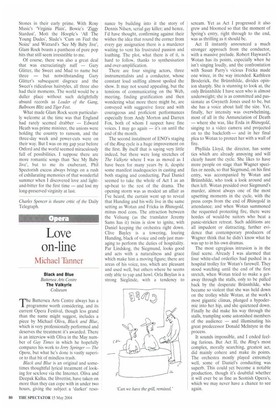Love on-line
Michael Tanner
Black and Blue Battersea Arts Centre The Valkyrie Coliseum
The Battersea Arts Centre always has a programme worth considering, and its current Opera Festival, though less grand than the name might suggest, includes a piece by Michael Oliva, Black and Blue, which is very professionally performed and deserves the treatment it's awarded. There is an interview with Oliva in the May number of Gay Times in which he hopefully compares his work to Jerry Springer — The Opera, but what he's done is vastly superior to that bit of mindless trash.
Black and Blue is an original and sometimes thoughtful lyrical treatment of looking for sex/love via the Internet. Oliva and Deepak Kalha, the librettist, have taken on more than they can cope with in under two hours, giving the subject a 'darker' reso
nance by building into it the story of Dennis Nilsen, serial gay killer; and hence, I'd have thought, confirming against their wishes the idea that round the corner from every gay assignation there is a murderer waiting to vent his frustrated passion and loathing. The plot, what there is of it, is hard to follow, thanks to synthesisation and over-amplification.
There are four singing actors, three instrumentalists and a conductor, whose constant loud sniffing almost spoiled the show. It may not sound appealing, but the tensions of communicating on the Web, meeting, finding gratification and then wondering what more there might be, are conveyed with suggestive force and with courageous and proficient performances especially from Andy Morton and Darren Fox, both of whom I suspect have fine voices. I may go again — it's on until the end of the month.
The second instalment of ENO's staging of the Ring cycle is a huge improvement on the first. By itself that is saying very little indeed, but there were long stretches of The Valkyrie where I was as moved as I have been for many years by it, despite some manifest inadequacies in casting and both staging and conducting. Paul Daniel seemed to take the whole of Act I as an up-beat to the rest of the drama. The opening storm was as modest an affair as I've heard, the curtain went up to reveal that Hunding and his wife live in the same setting as Wotan and Fricka in Rhinegold, minus mod cons. The attraction between the Velsung (as the translator Jeremy Sams has it) twins is slow to ignite, with Daniel keeping the orchestra right down. Clive Bayley is a towering, louring Hunding, black of voice and only just managing to perform the duties of hospitality. Par Lindskog, the Siegmund, looks good and acts with a naturalness and grace which make him a moving figure; there are areas of his voice, too, which are pleasant and used well, but others where he seems only able to yap and howl. Orla Boylan is a strong Sieglinde, with a tendency to scream. Yet as Act I progressed it also grew and bloomed so that the moment of Spring's entry, right through to the end, was as thrilling as it should be.
Act II instantly announced a much stronger approach from the conductor, with a massive prelude. Robert Hayward's Wotan has its points, especially when he isn't singing loudly, and the confrontation with Susan Parry's vicious Fricka made one wince, in the way intended. Kathleen Broderick, the BrUnnhilde, divides opinion sharply. She is stunning to look at, the only Brilnnhilde I have seen who is almost underweight; she is as committed and passionate as Gwyneth Jones used to be, but she has a voice about half the size. Yet, finally, her intensity was overwhelming, most of all in the Annunciation of Death — where she was, like Erda in Rhinegold, singing to a video camera and projected on to the backcloth — and in her final plea to Wotan to protect her with a wall of fire.
Phyllida Lloyd, the director, has some tics which are already annoying and will clearly haunt the cycle. She likes to have more people on stage than Wagner specifies or needs, so that Siegmund, on his first entry, was accompanied by Wotan and Briinnhilde, who took a look around and then left. Wotan presided over Siegmund's murder, almost always one of the most upsetting moments in the cycle, with the press corps from the end of Rhinegold in attendance; and when Wotan summoned the requested protecting fire, there were hordes of would-be suitors who beat a panic-stricken retreat. Such additions are all impudent or distracting, further evidence that contemporary producers of Wagner think that he didn't know what he was up to in his own dramas.
The most egregious intrusion is in the final scene. Already I was alarmed that four white-clad orderlies had pushed in a hospital trolley for Wotan's farewell. They stood watching until the end of the first stretch, when Wotan tried to make a getaway through the stalls, only to be pulled .back by the desperate Brannhilde, who became so violent that she was held down on the trolley while Wotan, at the work's most gigantic climax, plunged a hypodermic into her hip, and she quietened down. Finally he did make his way through the stalls, trampling some astonished members of the audience — and illuminating his great predecessor Donald McIntyre in the process.
It sounds impossible, and I ended feeling furious. But Act II, the Ring's most complex, morally searching, greatest act, did mainly cohere and make its points. The orchestra mostly played extremely well, some of Daniel's conducting was superb. This could yet become a notable production, though it's doubtful whether it will ever be as fine as Scottish Opera's, which we may never have a chance to see again.


































































































 Previous page
Previous page